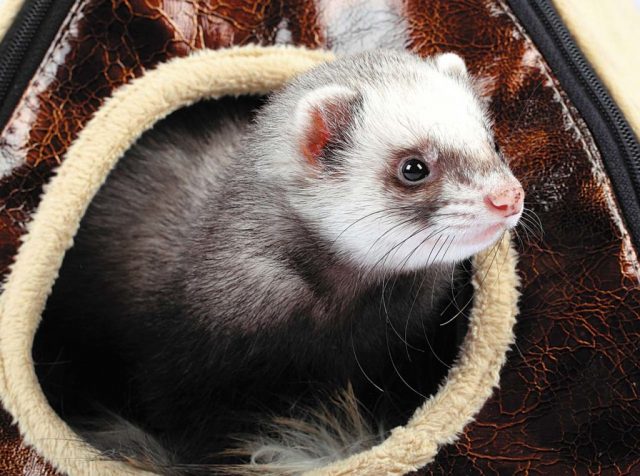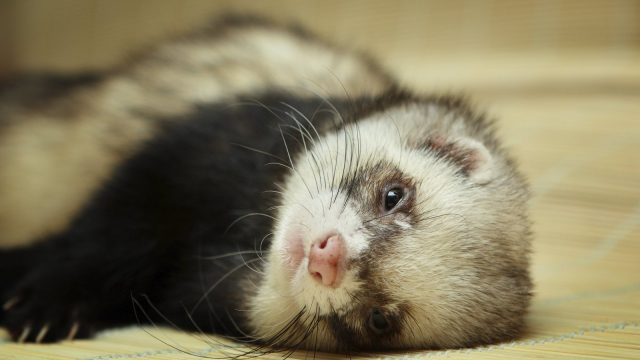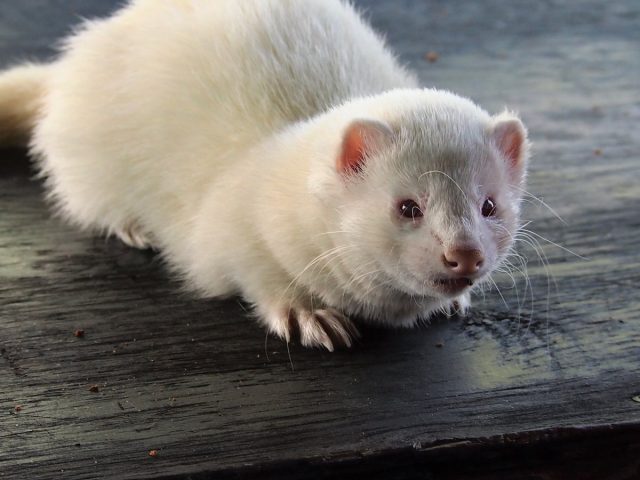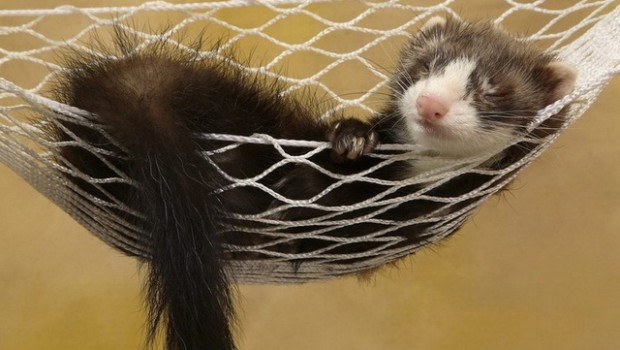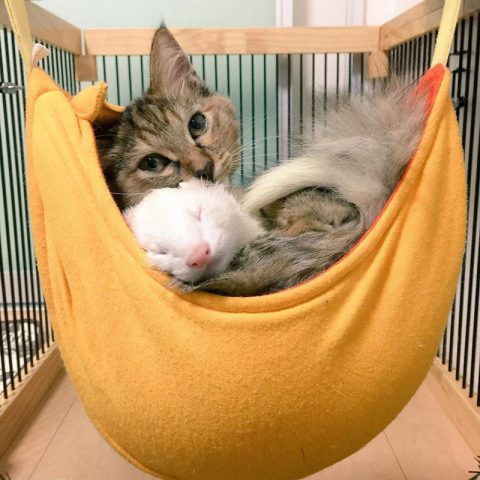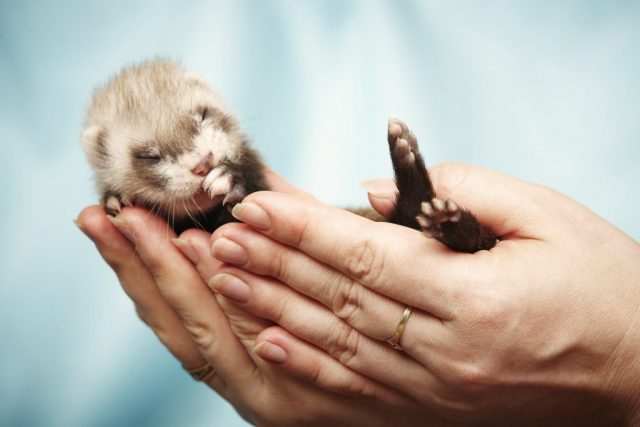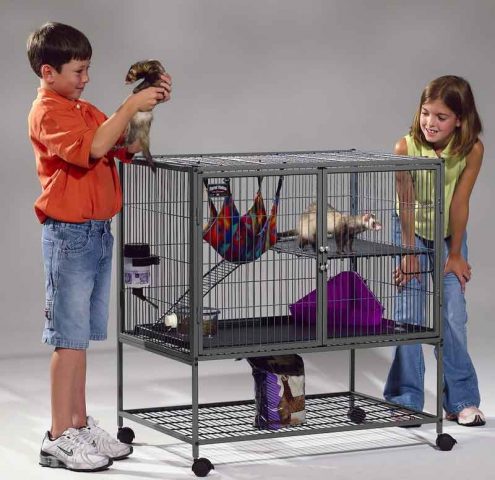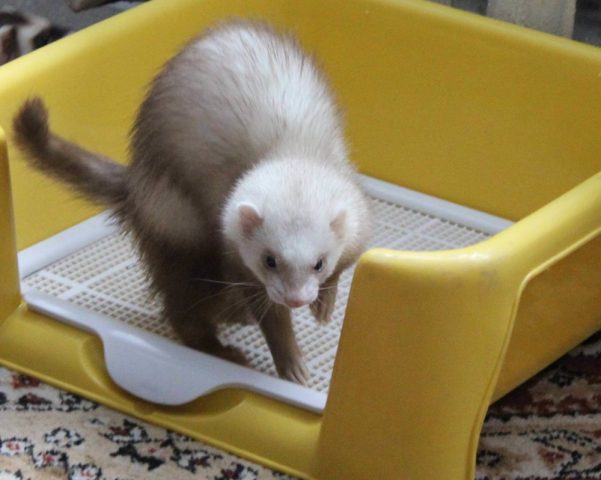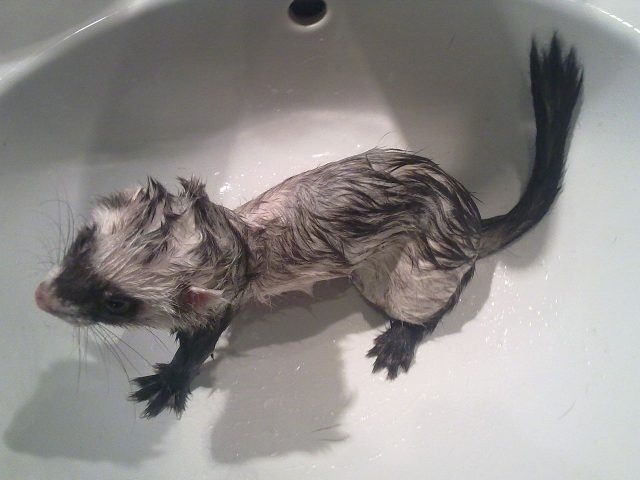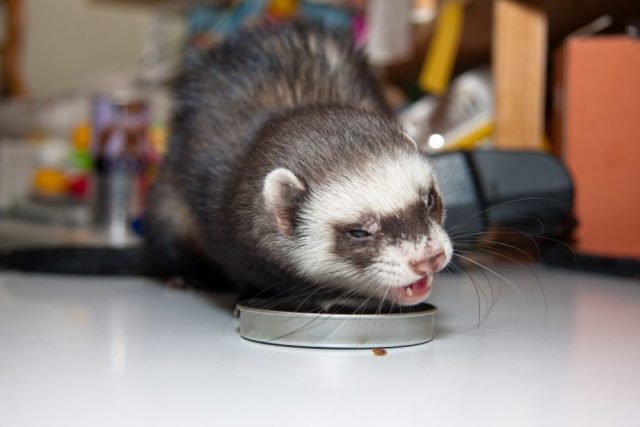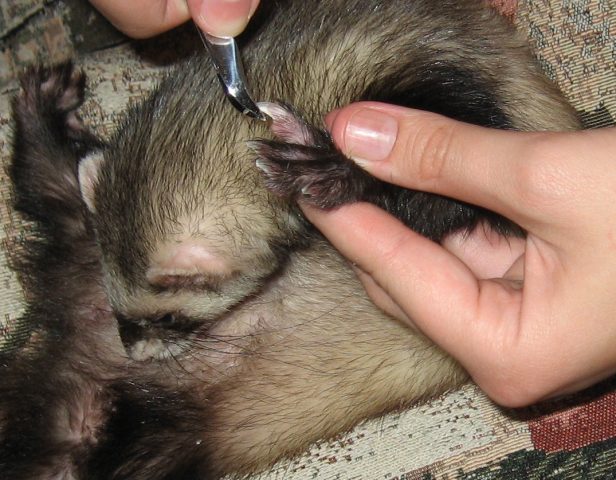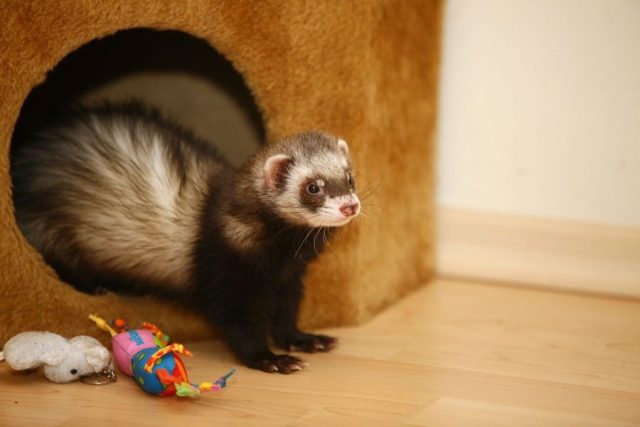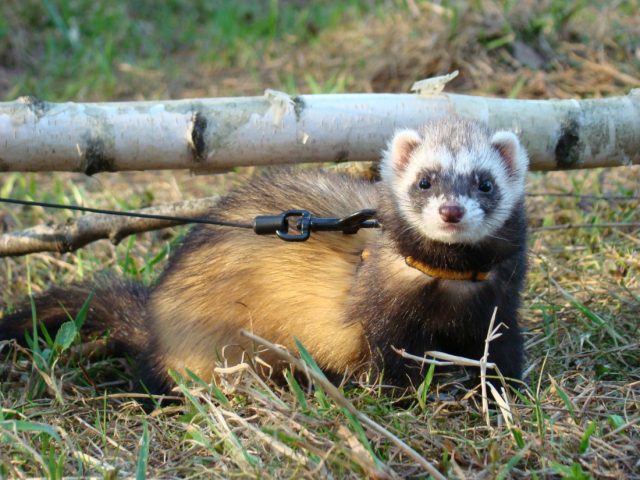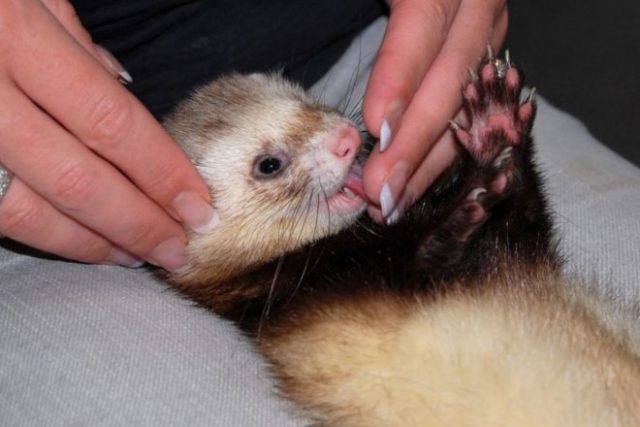Content
Probably, every person, at least once in his life, had a desire to have a pet. Cats and dogs are no longer so interesting - recently, the fashion for exotic and wild animals is gaining popularity. One of these options is a domestic ferret. Keeping this animal and caring for it is not an easy task, because today few people are familiar with the habits and character of an outlandish animal.
All the features of keeping and breeding troreas at home will be discussed below. Here you can find detailed instructions on "raising" animals: from an approximate cost estimate to how to trim claws.
Description of decorative ferrets
Ferrets appeared in the houses and apartments of Russians only 8-10 years ago, while in Europe and the USA these animals were “tamed” more than 40 years ago. You cannot argue about the exoticism of such a pet: a graceful ferret with incredibly soft fur walking on a leash will certainly attract the glances of passers-by.
Not all choris can live in captivity. Only one of the many wild breeds, the forest ferret, has been specially domesticated. Such a tamed type of animal is usually called a ferret. This animal is small in stature, with short legs, has an elongated squat body and a very beautiful fluffy tail.
In nature, the forest ferret "wears" a fur coat of only one shade - dark brown. But in a domesticated pet, the color can be almost any: from white to black, spotted individuals are often found. Below is a photo of a pet ferret: an incredibly cute creature!
Many people get ferrets because of their fur, because the pet's fur is incredibly soft and pleasant to the touch. And also, the ferret is very graceful, and you can watch him for hours - the animal has interesting habits and a multifaceted character.
Ferret personality and habits
In Latin, "ferret" is translated as "cunning thief", and this says a lot about the character of the pet. However, you should not think badly about the animal - its temper is very complex, the animal's habits have not only disadvantages, but also "fat" advantages.
Before starting a pet, you need to learn about the nature of the pet ferrets. Ferrets differ in the following traits and habits:
- The domestic animal is very mobile, energetic, it always has a good mood. The owner of the ferret will never be bored, because this is a "perpetual motion machine" that rarely sits still. It's interesting to watch the ferrets, because they have a lot of things to do (even in a one-room apartment).
- The ferret is very smart, it lends itself well to training, and, with enough patience, it is really possible to teach the animal several commands.But here do not forget about the cunning of domestic ferrets - training can be incredibly fun.
- The domesticated animal quickly gets used to a new place and immediately begins to explore "uncharted territories". Thanks to this character trait, a ferret can be taken with you on vacation or on a visit - this will be great entertainment for the animal, and not a psychological trauma (as for a cat, for example).
- Ferrets are easy to toilette, which is great news for those looking to adopt an exotic pet.
- Ferrets quickly get used to the rhythm of their master's life, they will not make much noise or disturb a person. The ferret may not sleep at night, but he rarely wakes up the other inhabitants of the apartment.
- Ferrets do not need to be walked, so the animals are perfect for those who are always pressed for time. If the owner wants to walk with the ferret, the animal will only respond with gratitude - for him this will be an occasion to learn something new (the ferret is incredibly curious and curious).
Should I have a ferret in an apartment?
The care and maintenance of a pet ferret will not be the same as for a dog or cat. The future owner of the ferret must prepare for the appearance of an unusual pet in the house, he will have to learn a lot of new things, purchase everything necessary for a little ferret in advance.
The dimensions of many modern apartments do not allow having a dog in the house, and a large percentage of people are allergic to cats. In this case, the ferret is an excellent pet option, because it does not take up much space and very rarely causes allergies.
Ferrets as pets: the pros and cons of keeping
A photo of a ferret ferret will not leave anyone indifferent: the animal is really very beautiful and charming. Attractive appearance is one of the many advantages of a pet animal. Ferrets also have other benefits, such as:
- The size of the animal is very "compact", and this quality causes a lot of positive feedback from the owners of pet ferrets. The animal can be carried in your arms, put in a bag or backpack, carried in public transport or in a taxi.
- Unlike cats, ferrets do not mind putting on leashes and harnesses. Walking the animal will be safe, and it will not run away anywhere.
- After spaying, these pets do not become lethargic and fat. On the contrary, castrated ferrets are even more active and mobile.
- The thick fur of ferrets is not only beautiful, it is an excellent thermostat: in winter, the animal does not have to be dressed up like a tame dog, and in summer it will not get heatstroke.
- Ferrets are very playful, they are constantly on the move - the owner will not be bored.
In addition to the advantages, domestic ferrets also have such features that you need to know about even before buying a pet. The owners of ferrets note the following nuances of their content:
- The hair of the trochee has a specific musky smell that some owners may not like very much (this issue is solved by castration or regular bathing of the animal).
- Ferrets are prone to overeating, so the owner will have to carefully monitor the pet's diet.
- Curious ferrets love to chew on hard objects. So they can not only ruin the right thing, but also gorge themselves on plastic, for example.
- When raising pets, one should not "give slack". Feeling impunity, the ferret "becomes impudent" and begins to spoil the furniture, tear the wallpaper, and behaves aggressively.
- Ferrets are very clean, so their toilet and house should always be clean. If the owner does not have time for regular cleaning, the animal begins to "crap" in the secluded corners of the apartment.
- A lot of money is needed to keep outlandish animals, because domestic ferrets need special food and regular care.
- Domesticated ferrets often "steal" and hide small things - ferret owners often look for a second sock or a gold earring. We'll have to keep order in the house and put away all the little things "under lock and key."
- The ferret is not suitable for those who grow indoor plants. In nature, this animal constantly digs holes, having seen the ground, it will immediately begin its favorite pastime.
Before deciding to keep a ferret at home, be sure to weigh all the pros and cons - the animal is not easy. If the animal does not "take root" in the house, it will be difficult to attach it - not every pet lover will agree to take a demanding ferret.
Do ferrets get along with cats and dogs?
The merits of tame ferrets include their friendliness. Ferrets are absolutely not afraid of other animals, which makes it much easier to keep a ferret at home in an apartment where there is already a beloved pet.
Ferrets love to play with cats and dogs. And these large animals, in turn, also perceive fluffy animals well. There should be no jealousy conflicts between pets - ferrets do not require too much attention from the owner.
Should you have ferrets if there are children in the house?
Small children in an apartment can be a "contraindication" to buying a pet ferret. Do not forget about the origin of these pets: at any second the ferret can become aggressive and harm the baby. The nature of children and ferrets is somewhat similar: they love to play and have an excitable psyche. This often leads to scratches and bites on the child's body, as well as injuries to the animal itself.
If a newborn appears in the apartment where the ferret lived, most likely, the animal will have to be attached to good hands. There are cases when an animal attacked an infant and harmed him. It has been proven that ferrets do not like the smell of the baby and the sounds they make and cause aggression in them. For the sake of justice, it is worth saying that some owners note the special tenderness of domestic ferrets for young children (but this is more likely an exception than a rule).
Selection rules
Like any pet, the ferret is not recommended to be bought from the market. These animals are often aggressive in nature, and sellers from the market can use special drugs to calm the animals. In addition, no one guarantees that such a pet will be healthy. The future owner does not know the exact age of the ferret. It is recommended to purchase a pet ferret either from private breeders or in a club.
When buying a ferret for home, you need to know some rules. Before deciding on a particular ferret puppy, you should analyze the following:
- The nature of the pet. It is easy to find out how flexible or aggressive an animal is by the behavior of the breeder. If the owner, without fear, takes the puppy with his bare hands - the ferret is affectionate and accustomed to the hands. When the breeder himself puts on gloves and tries not to bring the ferret closer to his face, one should think about it.
- Babies under 1.5 months can be a little sleepy and sluggish. Such a condition in older puppies should cause alertness - the ferret may be sick.
- The color of all small ferrets is the same - gray.You can find out what shade the fur of a matured ferret will have if you look at its parents.
- In addition to the genitals, females and females of domestic ferrets differ in muzzles: in "girls" the muzzle is more elongated and pointed. The sizes of animals of different sex are also different: males are usually much larger than females.
- You can find out the approximate age of a pet by its teeth. Three-month-old puppies should already have fangs in their mouths: sharp and snow-white. The yellowish tint of the teeth speaks of the "advanced" age of the ferret. In such animals, the tops of the teeth are usually worn off.
- Often unscrupulous sellers try to pass off adult female ferrets as puppies. If a small animal has coarse hair and yellow teeth, one has to suspect deception.
To get to know the animals better, a video about domestic ferrets and their habits will help:
Whom to choose: female or male
Male and female trorets have pronounced external differences: the "boys" are larger, they have a stocky body structure, a flat muzzle, and large paws. The habits and habits of animals of different sexes are also very different. So, male ferrets have the following qualities:
- they need more food;
- the pet secretes more feces;
- the smell exuded by the skin in males is stronger;
- "Boy" can lie in one place for a long time, bask on the owner's lap;
- male ferrets do not slip out of harnesses, they are comfortable to walk.
During the rutting period, the male ferret behaves almost in the same way as the cat: he "marks" the territory.
Female ferrets have their own distinctive features in behavior:
- eat less and defecate less;
- do not have such a pronounced odor as in males;
- "Girls" are more mobile and emotional;
- often female ferrets slip out of the harness during a walk.
During the rut, female ferrets become very agitated and anxious - this can greatly tire the owner. In addition, ferrets rarely come out of heat without the help of a veterinarian or taking special medications.
If you decide to have a ferret in the house only as a pet, it is better to choose a male. When the owner wants to become a breeder and breed ferrets, then, of course, it makes sense to buy females.
What are the costs
Keeping ferrets at home for beginners and inexperienced owners can be fraught with an unpleasant surprise - such pets will cost a lot. Before buying a small animal, it is better to make a rough estimate. Obligatory expenses for a pet ferret:
- ferret puppy - from 2 to 20 thousand rubles;
- cage - at least 3000 r;
- food - from 300 rubles per kilogram (the better and safer for a domestic ferret, the more expensive);
- vitamins and nutritional supplements - about 400 rubles per month;
- tray - 50-300 rubles;
- a house or a couch, a hammock - 500 r and more;
- shampoo - 100-200 rubles;
- leash - 500-700 r;
- toys - 100-300 rubles (you will need to update it regularly);
- scissors for cutting nails - 150-200 rubles;
- vaccinations - 500-600 rubles per year;
- sterilization / castration - 700-3500 rubles (more expensive for females);
- carrying bag (for trips to the vet, for example) - from 300 rubles.
Ferrets rarely get sick, but no one is immune from this. For an appointment with a veterinarian, you will have to pay 400-600 rubles - only a consultation. For example, a cardiogram for a ferret will cost 600-750 rubles. Serious treatment with surgery and hospitalization can "result" in the amount of up to 30 thousand.
Propagate or sterilize
Photos of ferrets living at home, reviews full of admiration about these smart animals, can make you want to breed pets. In the conditions of a city apartment, it is better not to breed animals, but the inhabitants of private houses can try to make money on breeding ferrets.
Ferrets are ready to mate from late winter to mid-summer. The first time to "knit" animals is recommended not earlier than 10 months (although the rut in males and females of domestic ferrets can begin as early as six to seven months of age). For mating, the female is placed in a cage with the male and left together for several days.
Domestic ferrets can bring offspring 1-2 times a year. Depending on during which period of the cycle fertilization took place, a female ferret leads from 2 to 12 babies.
If the owner of the pet does not set himself the goal of breeding ferrets, it is better to castrate both the female and the male. The operation will have a beneficial effect not only on the behavior of the animal, but also protect its body from possible tumors and other problems.
How to keep a ferret at home
For a ferret to feel good in an unfamiliar house, grow up healthy and be constantly cheerful, she needs to create suitable conditions. It is necessary to prepare your house for the arrival of a new "tenant" in advance. The first thing the owner of the ferret should do is to close up all the cracks in the floor and walls, with a diameter of more than three centimeters.
A curious pet can also get into the housing of household appliances, so all equipment in the house must be inspected and secured. Rubber and rubber objects, electrical wires, small plastic parts will have to be hidden - the ferret will certainly begin to gnaw them. Pots with indoor flowers and boxes with seedlings are also removed, otherwise the pet will dig holes in the ground and damage all the plants.
You can settle your pet in a living room, on a heated balcony, loggia or in a cage. Of course, the ferret feels best in a large room. If it is decided to keep a ferret in a cage, a spacious and multi-storey “house” is chosen for her.
How to care for your ferret at home
In the cage or in the corner of the room reserved for the ferret, you need to arrange the things necessary for the animal: a tray, a feeder, a drinker, toys and boxes for "hide and seek". All items must be kept clean, then no unpleasant odor will appear in the house. The floors near the tray and feeders must be cleaned regularly, otherwise the ferret will not come up to them.
How to tray train your ferret
In order for a pet to get used to peeing in a designated place, the first thing a person must provide for a ferret is cleanliness. If the owner uses an empty tray, it will have to be washed several times a day as it gets dirty. In the case of toilet filler, it is changed regularly.
To train a homemade ferret to the tray is not an easy task, but doable. There are several rules:
- The tray should be firmly attached to the floor or cage - with suction cups or clamps. Otherwise, it will become a toy for the ferret.
- A pet will not “walk” into an already dirty litter box, and ferrets have a very fast metabolism (they can defecate more than ten times a day). Therefore, it is better to place several trays around the house.
- Ferrets do not know how to "endure", if the animal does not find a clean tray, it will pee right on the floor.
- Before putting the litter box, you need to follow the animal - it is easier to teach the ferret to defecate in the place that he has chosen.
- After sleeping or eating, you need to watch your pet ferret. At this time, he usually begins to look for a "secluded place".The owner only has to "direct" the animal to the tray.
- It is better to choose special corner trays for pet ferrets - animals get used to them much faster.
How to bathe your ferret
After sterilization, ferrets are much less likely to need bathing, because the smell from them becomes several times less pronounced. One or two bath procedures per month will be enough for your pet. The owner will be pleasantly surprised by the ferret's love for water, he will not break free and scratch - this pet loves to swim very much.
Bathing water temperature should be high enough - 39-45 degrees. On sale you can find special shampoos for domestic ferrets, but cat "cosmetics" are also quite suitable.
Feeding
The domestic ferret is a carnivore, so most of all he loves to eat raw meat and fish. However, such a diet is dangerous to the health of a domesticated pet; natural food should be given to it only together with dry food. Chorus specialty foods can be found online or at major pet stores.
Raw quail or chicken eggs, low-fat cottage cheese, and hard cheese are suitable as a natural supplement to the diet of a domestic ferret. You need to feed the animal 2-3 times a day. The homemade ferret will not eat "yesterday's" food, so a little food is poured on her, after eating the dishes must be washed.
How often do you need to change the litter
Caring for and keeping a ferret at home is not easy. Even a litter is not suitable for a finicky animal. It is best to cover the floor of the choric cage with a piece of thick cloth. To keep the "house" clean, it will be enough to wash the bedding once or twice a week.
It is better not to use sawdust and hay for keeping ferrets, they can cause various diseases in animals. If there is a hammock or “sleeping tube” in the cage, and the ferret likes to sleep there, you can completely refuse bedding.
Sharp claws: pedicure at home or at the vet
A pet's uncut claws are not only a risk for upholstered furniture and carpets in the house, they can cause injury to the animal itself and to its owner. How to trim your ferret's nails at home can be seen in this video:
As a tool, it is better to use special scissors for trimming the nails of cats and ferrets. If the owner cannot trim the claws of the pet on his own, you can contact the veterinary clinic, for a specialist it is a matter of a few minutes.
Ferret toys
The ferret always chooses what and how to play. For this pet, even an ordinary box or some kind of garbage can become a favorite toy. However, not all of these items are safe for the ferret. The best toys for pet ferrets are:
- special cat toys from the pet store;
- hard balls with rattles inside;
- soft toys made of fleece or faux fur;
- unnecessary cardboard boxes;
- pieces of PVC pipe with non-sharp edges;
- hanging toys for parrots (if they have a rope, the ferret should play under supervision);
- hard plastic teethers and rattles for babies;
- tents or houses;
- old bags;
- hammocks and pipes for home ferrets.
Toys made of soft plastic, rubber or rubber can become unsafe for ferrets - everything from which the animal can bite off and swallow it. Toys with small parts should be avoided. Any toys that have been chewed or damaged should be discarded immediately.
Now for a walk
Indoor ferrets are very fond of walks in the fresh air.In order for walking to bring health benefits to the pet, not harm, you need to follow several rules:
- Only walk animals that are regularly vaccinated.
- You should not take a puppy under the age of 9 months with you to the street, he still has too weak immunity.
- Those ferrets who go for walks should be regularly treated for parasites (fleas, ticks, worms).
- You need to walk pet ferrets only on a leash, frightened or carried away, the animal can quickly run away.
- Two fingers should fit between the ferret's neck and the harness.
- For walking, it is better to choose calm parks away from the roads. It is advisable that there are no dogs nearby.
You can walk with a pet ferret at any time of the year. Only in intense heat and severe frost is it better to stay at home.
How to tame your ferret
Although not forest ferrets are brought up in the apartment, but their domesticated relatives, sometimes the new owners have problems - the animals show aggression and demonstrate complete disobedience with their behavior.
It is necessary to tame a pet ferret in several stages:
- Purchase several pairs of sturdy gloves so that you do not suffer from unsuccessful training attempts.
- First, lure the animal with delicious food.
- When he begins to approach without fear for a delicacy, transfer a piece to his palm - so that the ferret would eat from her hand.
- Then you can gently stroke your pet.
- It is better to take the ferret completely in the arms during sleep. Waking up, the animal will see its owner and understand that the person has not done him any harm.
Conclusion
The domestic ferret is a tricky but very interesting animal. You should not have such a pet in the heat of the moment, indulging your own or children's whims. First, you should learn about the nature and habits of the cunning creature, prepare a house for him and all the necessary attributes. The maintenance, and even more so, the breeding of ferrets is a troublesome and costly business. But a cute fluffy is worth all this - he will quickly get used to the house, to a person and become his best friend.
